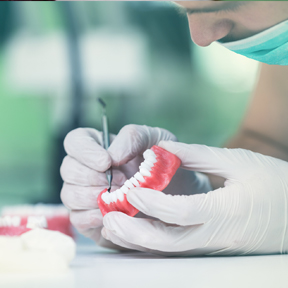Dentures & Partial Dentures
Full dentures, also called complete dentures, replace all of the natural teeth and provide support for cheeks and lips. By replacing missing teeth, full dentures not only support sagging facial muscles, but also improve our ability to speak and eat. Full dentures are divided into two categories according to when they are made and inserted into the mouth:
Conventional
Conventional dentures are made and inserted after the remaining teeth are removed and the tissues have healed.
Immediate
Immediate dentures are inserted immediately after the removal of the remaining teeth. An advantage of immediate dentures is that the patient does not have to be without teeth during the healing period. However, immediate dentures may require rebasing or relining to fit properly after gums shrink from the healing period.
Partial Dentures
A removable partial denture fills in the space created by missing teeth and fills out your smile. Removable partial dentures usually consist of replacement teeth attached to pink or gum-colored plastic bases, which are connected by metal framework, and attach to your natural teeth with metal clasps or precision attachments. Precision attachments are nearly invisible, but often require crowns on your natural teeth for a precise fit, and generally cost more than those with metal clasps.
Both full and partial dentures may need to be adjusted or replaced over time. Your mouth naturally changes as you age, and bone and gum ridges can recede or shrink, causing the denture to fit loosely. Because loose-fitting dentures can cause sores and infections, it is best to see our specialists regularly to check the fit of your denture and make any necessary adjustments.




Call 412.621.0200 or email office@dentalpgh.com
today for an appointment
